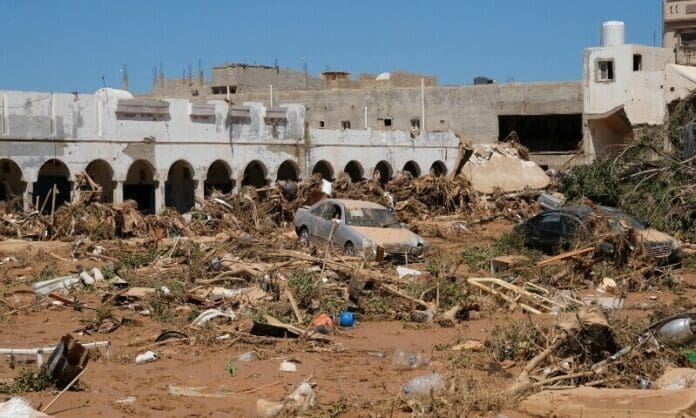A massive flood in Libya has claimed the lives of nearly 4,000 people, with thousands more missing and widespread devastation in the city of Derna. Relief efforts are underway, with countries like Turkey, Egypt, and the United Arab Emirates rushing aid to the war-torn nation. The flash flood, likened to a tsunami, occurred when two upstream dams burst due to torrential rains brought by Storm Daniel.
State media footage shows the aftermath of the flood, with debris littering the streets and bodies wrapped in blankets lining the ravaged sidewalks. Satellite images reveal that coastal neighborhoods of Derna were almost completely submerged. The United Nations has pledged $10 million in support for survivors and estimates that at least 30,000 people have been left homeless in Derna alone.
Lieutenant Tarek al-Kharraz, spokesperson for the eastern-based government’s interior ministry, confirmed the death toll had reached 3,840 people, including 400 foreigners and about 2,400 still missing. However, some reports suggest a higher toll. The International Federation of Red Cross and Red Crescent Societies also predicts that the death toll will continue to rise.
Oil-rich Libya is still recovering from the aftermath of the 2011 uprising that toppled long-time dictator Muammar Gaddafi. The country remains divided between two rival governments, with the eastern region particularly affected by the flood disaster. The city of Derna was hit hard, with its hills and riverbed transformed into a torrential river that destroyed bridges and caused mudslides.
The Norwegian Refugee Council reported that nearby areas were also affected by mudslides and flooding, leading to further devastation. Erik Tollefsen from the International Committee of the Red Cross warned about the risks posed by landmines shifted by the floodwaters. Several nations, including Egypt, Turkey, France, Italy, Qatar, and Tunisia, have offered urgent aid and rescue teams to help cope with what the UN has called a “calamity of epic proportions.”
Climate experts have linked Libya’s deadly disaster to the country’s years of political chaos and lack of infrastructure investment, combined with the impact of a warming planet. These hurricane-strength Mediterranean storms, known as “medicanes,” are becoming more intense due to warmer air absorbing more moisture. Such extreme weather events, coupled with inadequate infrastructure and emergency response services, are particularly devastating in strife-torn and poor countries.
The deadly flood in Libya serves as a stark reminder of the devastating flooding events that may become increasingly common in the future as the world continues to heat up.
